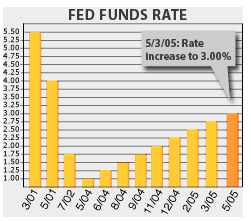|
|
Fed Rate to go to 3.25% /Not Good for Leasing by Kit Menkin
The New York Times forecast that Federal Reserve the end of this month, Thursday, “is all but certain to raise the federal funds rate on overnight loans between banks by another quarter point, to 3.25 percent." It will then become the ninth increase in the last year. It also appears the central bank is expected to signal that it will continue to raise overnight rates at a "measured" pace. In the leasing industry, all the attention and media coverage about rates cause customers to be more “rate conscious” than ever, resulting in lower margins just to get the business. Those more desperate, go after more “sub-prime” business just to make the yields better to their bottom line today. What tomorrow brings, hopefully they will be at another bank or leasing company by that time, usually 12 to 18 months after the deal is booked. Not to belittle those of us in business, but we are now getting used to “another rate increase.” The event should get more attention from those in business than it does. To me it is almost like sales tax, gasoline or hotel tax or bridge fees. Here in the San Francisco Bay Area the bridge fees are to go to $4 or $5 to cover the cost of an up-date of the Bay Bridge that connects the Oakland/East Bay to San Francisco itself. All these small taxes or fees just keep building up. The Golden Gate Bridge fee was 25 cents and the toll for crossing to disappear in the late 1940's. We take all these increases in stride. It's normal. It reality. It's the way of life. Our problem is that we are not only in the middle of the forest, so we not only don't see all the trees, we aren't even aware of the continent let alone the other continents that affect our tree. It is time many of us take some courses offered by our trade associations, local colleges and universities. Perhaps even a high school summer class in fundamentals may be in order. We need to become better educated about our business environment. The economy's trade imbalance and deficit require a more robust economy, but without inflation. It has become very obvious that the Federal Reserve is in the mode to raise rates, but as slowly as possible. It shies away from long term rate investments. Certainly the long term rate is not only effecting the long term asset committees of various banks regarding the use of their products, but also the money availability and product need, which drives the mortgage rate and leasing industry marketplaces, too. Fannie Mae and ABS market place have been warned about two many short term mortgages, sub-prime approval; however the bottom line is more Americans own homes than ever before due to the low rates, plus those who would have difficulty use their credit card accounts to put cash down and/or pay other household bills because as any homeowner knows owning a house is more expensive than the monthly payment. The once favored bond market has been the victim of the low rates. The term premium - the added payment that investors demand to cover the uncertainty of holding long-term bonds - has shrunk to almost nothing. Investors appear to assume that the overnight rate will be about 3.75 percent by the end of this year. But the yield on 10-year Treasury bonds remains about 4 percent. One school of thought holds that low bond yields indicate fears of a slowing of economic growth, which would reduce demand for credit in the future. Another economic group believes that global investors have lower inflation expectations than in the past, which reduces the risk of holding long-term bonds. According to the New York Times' Edmund Andrews,"... long-term interest rates may have been depressed by other factors, including a 'savings glut' around the world and efforts by Asian central banks to keep the value of their currencies down by buying United States Treasury securities. "If that is true, the flood of foreign money into the country could be diluting the Fed's effort to prevent inflation, "his article concludes. " That would imply that the Fed needs to raise rates more than many investors are expecting. Even Federal Reserve Chairman Allen Greenspan is concerned about the long term rates not being greatly affected as in the past by rising short term rates. At one time, long term rates were a hedge on profits, but perhaps not when it is obvious to all that short term rates will continue to go up, so why put money into long term? Time for that college or even high school economic refresher course as the teachers see the entire world, not just your tree in your local forest. We need to be smarter in understanding what is happening to us today. Books such as the ones written by Professor Johnson along with Barry Marks and Rick Gatelli need to be read not only by those new to the leasing business, but by veterans who need to keep up with all the changes. Yes, leasing is still the same, but it also “isn't.” |
|


